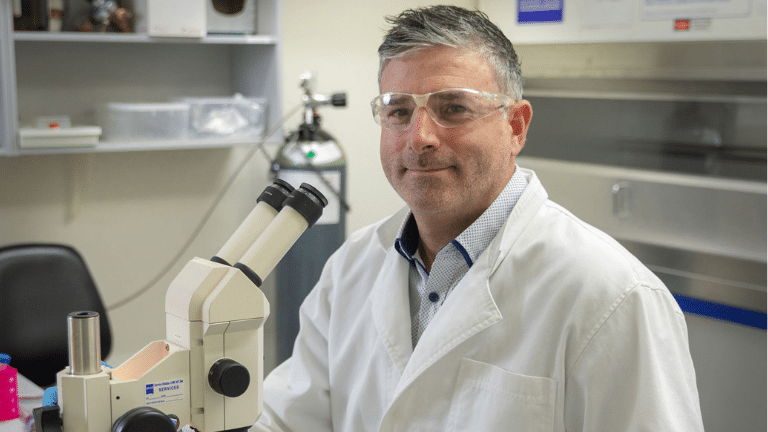
HMRI Infertility and Reproduction researcher, Associate Professor Geoff De Iuliis, says, “The process of making high quality sperm is intensive. When men are under external or internal stresses, a range of sperm production and maintenance processes start to faulter.
“Sperms cells are an incredibly unique and do not have the same protective strategies as other cells. This means that they are one of the first cell types to be impacted by poor health. This sensitivity is the basis for the classic phrasing around the idea that the sperm cell is like the canary in the coal mine for men’s overall health,” he says.
So how can men find out how healthy their sperm is?
“Many of the basic tests such as sperm count and motility can be performed via pathology services or an IVF clinic and can actually give us good clues toward understanding overall sperm health.
“Our research program routinely screens semen samples for many sperm quality markers, with some assays probing to quite some depth. For example, we can drill down to the level of the sperm DNA and identify how intact the precious paternal genome cargo is,” says Associate Professor De Iuliis.
In terms of environmental factors, there are some things that are known to damage sperm. They are heat stress, Per- and polyfluoroalkyl substances (PFAS – also known as ‘forever chemicals’) and acrylamide, a naturally occurring compound that comes from caramelising or toasting foods.
Associate Professor De Iuliis says, “PFAS is a relatively new one for us. We have been investigating this class of molecules for the last five years or so. So far, we are finding limited direct impact on sperm cells themselves but that is not to say these molecules are not impacting our biology.
“There is some recent work led by program members Dr Jacinta Martin and PhD Candidate Leah Calvert, that suggests that the sperm exposed to these compounds, while not being overtly damaged themselves, may be impacted in potentially a more sinister way. When these exposed sperm go on to fertilise and egg, we see alterations in the normal molecular programming within the early stages of the embryo that is formed. Some further findings suggest that sex hormones could also be impacted by these manmade and ever persistent PFAS chemicals.”
There is also another invisible factor that the Infertility team is exploring: exposure to wireless devices.
Associate Professor De Iuliis says, “We know that in controlled experimental conditions sperm do become damaged after exposure to electromagnetic energy – the same energy/fields/radiation that are used in our current wireless communication technologies. We are very quick to say here that we still do not know if these factors are damaging sperm in ‘real life’. Nevertheless, we have shown without a doubt, that there is, even if very small, a possible risk. Our continuing work is now tasked with getting a better handle on this risk, we of course are hoping there is no real need for alarm but I think we will all want to know for sure either way.”

Associate Professor Geoff De Iuliis
Want to improve your sperm health?
For men who want to improve their sperm health, the good news is there are a few easy things you can do.
Sperm health naturally declines with age – generally starting at around the age of 45-50 when testosterone starts to gently diminish. This is in contrast to females who carry eggs their whole life and don’t make new ones; males continually produce fresh sperm, around 1000 per second.
This means that if you make a conscious effort to improve your overall health by eating well, not smoking (a big one), reducing alcohol intake and increasing exercise, you have a good chance to improve your sperm health after about two months.
Associate Professor De Iuliis says, “Getting this word out to the community is a big part of what we try to do as a HMRI research program.
“For men who have tried things like these low intervention strategies for improving sperm health but are not getting the desired result, there are further avenues that we are currently trialing. This encompasses the culmination of decades of research and involves very specific antioxidant supplements that may have strong benefits for some cohorts of men,” he says.
The one thing all men need to know about sperm
“Sperm health is very good indicator of your overall health, which also means that the better your overall health, the better your chances of producing healthy sperm.
“The quality of your sperm is important for your immediate fertility but can also have long lasting impacts on the health of future generations, including the fertility of your children and grandchildren. This really puts into clear focus how important it is to look after your health when you are planning to conceive,” says Associate Professor De Iuliis.
HMRI would like to acknowledge the Traditional Custodians of the land on which we work and live, the Awabakal and Worimi peoples, and pay our respects to Elders past and present. We recognise and respect their cultural heritage and beliefs and their continued connection to their land.
Hunter Medical Research Institute
We’re taking healthy further.
Locked Bag 1000
New Lambton
NSW, Australia, 2305


This site is protected by reCAPTCHA and the Google Privacy Policy and Terms of Service apply.
Copyright © 2024 Hunter Medical Research Institute | ABN: 27 081 436 919
Site by Marlin Communications
